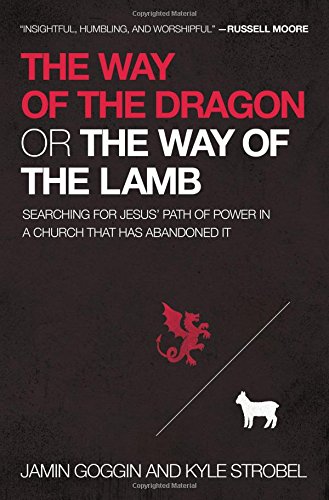 Book Review: The Way of the Dragon or the Way of the Lamb: Searching for Jesus’ path of power in a church that has abandoned it. Jamin Goggin and Kyle Strobel (Nashville: Thomas Nelson, 2017)
Book Review: The Way of the Dragon or the Way of the Lamb: Searching for Jesus’ path of power in a church that has abandoned it. Jamin Goggin and Kyle Strobel (Nashville: Thomas Nelson, 2017)
UPDATE 2020: as news breaks of yet another high-profile Christian leader being removed from ministry because of alleged spiritual abuse, and his titles withdrawn from publication, I thought it would be helpful to revisit this important book.
True: A well-known church had a well-known pastor, who fell spectacularly into disgrace, and removal from his ministry. The elders put out a carefully worded statement: yes, the man was a bully and domineered people; yes, he persuaded people to abuse the church’s budget to buy his books online and thus achieve a wholly bogus ‘best-seller’ fame; but no, there was no indication of immorality.
Why, ask Goggin and Strobel, do abuse of power and money not also count as immorality? Why it only sexual misconduct that is a serious enough sin to remove a pastor from a pulpit?
This is a tough, clear-eyed book about the ways churches are unwittingly world in their love of power, the damage we do to each other in our abuse of it, and has a call for us to stand up, stand out and be different. Money, sex, and power are one triad they explore, and the world, the flesh, and the devil are a second. There is something deeply devilish, or dragon-like, in the seduction of the church into the ways of the world. And the alternative ways of prayer, love and generosity are deeply counter-cultural, even in church.
They analyse the issue, and provide an alternative, by way of a series of (slightly artificially staged) interviews with seven mature Christian thinkers: Jim Packer, James Houston, Myra Chave Dawn, Jean Vanier, Eugene Peterson, Dallas Willard, and John Perkins. Most of those were familiar names to me; the exception was Perkins, who is a pastor, and was a leader of the black, non-violent resistance movement in Mississippi in the 1960s.
The description of the problem is an American one; therefore one UK question is whether we face our own encultured variant of it, and therefore whether their medicine is relevant.
They aren’t the first to analyse the problem, of course. They rightly name-check Os Guinness and C.S.Lewis, but they indicate that there are deeper and tougher roots to this weed. Augustine used a similar critique in his day, and deployed a third biblical triad in his Confessions: ‘the desires of the flesh and the desires of the eyes and pride of life’ (1 Jn. 2:16).
So to state the obvious, of course the problem is real, because the bible is true. Our Enemy will always seduce us with those devious but delicious alternatives to gospel work. The cultural form varies, though. In England, our church’s love of money shows itself less in high salaries and prosperity teaching, than in the hidden expensive educations of our preferred preachers, pastors, and writers, as shown in their accents and connections. Tie that with our love of power, and you have us in the grip of the very English problem of class. In fact a recent news story about an English evangelical scandal put money, sex and power together in a uniquely class-ridden context. (To be clear, I keep using the word ‘English’ because the issues in Scotland, Wales and Northern Ireland take different shapes).
2020 update – remember, I wrote this post in 2017.
I have known churches – more than a few – where the minister is feared rather than loved, and where the word ‘bully’ has been used to describe the relationship.
Does their answer fit? Again, it must do, if the bible is true.
Here is the single, most devastating sentence in the book: ‘“I am pretty sure a smart, productive atheist could do my job well,” said a successful pastor’ (p.167).
Let that sink in, and say it again to yourself – can you hear your voice there? The terrifying moment in that phrase, the word that kills us, is of course ‘successful’, and the authors interrogate that with clinical skill. What does it mean to your daily practice as a pastor, that we wrestle against principalities and powers, who are only cast out by prayer?
But we ought to be open to seeing that the authors’ answer is also culturally determined – to an extent. Their choice of interviewees is by and large the wise, older, slightly hidden sage, slightly mystical, and almost a Christian Yoda (Packer is the exception to this role: he is older, but not a passivist – he has engaged in theological battle and conflict). I am not quite sold on the guru-in-the-woods model, and there is something slightly sentimental it. I’m being careful here, because Perkins was and is a brave man, Vanier extraordinarily generous, and so on. Goggins and Strobel rightly point to the way the evangelical industry wants new, young, attractive stars, not the older, wiser but less photogenic Christians with deep roots. So my quibble is more with the authors, not the interviewees, and with they way they have crafted the work. They have described the polar opposite of the celebrity, market-focussed pastor, but done so in a way that does not quite help me, also a pastor. I live in a deeply secular north London, surrounded by intellectual and cultural hostility and content; retreating to a log-cabin to read and write books is not the template for my week.
So there’s something American-pastoral about the answer which does not quite sit right in my setting, something on the Whitman/Waldon axis. It might be a problem with me, and I admittedly have a similar problem with the wildly popular Marilynne Robinson.
Overwhelmingly, though, Strobel and Goggins have reminded us once again of our perennial temptations and our Tempter, and the only weapons at our disposal to deal with them. The way of weakness, suffering, servanthood, obedience, prayer, preaching, love – those Lamb-honouring spiritual disciplines are not culturally restricted, whatever forms the way of the Dragon takes in your church.





1 comments on “Book Review: The Way of the Dragon or the Way of the Lamb”